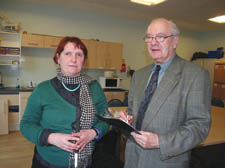|
|
 |
| |

Mary Hynes and Frank Hallett of Visually Impaired in Camden |
The disabled are suffering because of the Town Hall
Pressure group warn that means tests are causing stress for the vulnerable
DISABLED people in Camden face an increasingly difficult day-to-day struggle to lead their lives – because of swingeing Town Hall cuts.
Pressure group Visually Impaired in Camden say the current Lib-Dem/Tory administration is nibbling away at services for the disabled in order to keep council tax low.
Group secretary Frank Hallett said the imposition of means testing for simple care services not only meant his members were being charged twice – they had already paid for services through their council tax bills – but were facing undignified and intrusive questioning by council workers to gauge how much they can afford to spend on their care.
The group, which has been running for 20 years, was founded by blind people. They meet regularly at Swiss Cottage Community Centre and discuss issues that they face. They also have guest speakers – the Camden History Society and the Citizens Advice Bureau have featured, alongside a New Journal reporter talking about the role of local newspapers and the history of the paper.
Mr Hallett said: “We hear horror stories of how people are being treated all the time. Some of our members have been reduced to tears and have had to go and see their GPs after being visited by an assessor from the council.
“These are people who may need help keeping themselves clean, tidying their homes, cooking – fundamental things for daily life.
“Disabled people are suffering because of Camden’s attitude.”
Mary Hynes, who lives in Dartmouth Park, became blind 20 years ago. She was a student in Bristol when she was knocked off her bicycle by a car driver. The horrific accident meant she lost her sight.
Ms Hynes said the group’s members were having to work hard to safeguard the rights of the disabled.
“Since the last elections, which saw the Lib-Dem and Tory coalition take over, we are having to fight hard to conserve the rights we already have,” she said. “We have fought over the years to make our lives better, more manageable – and we feel those rights are being eroded. We are trying hard simply to preserve what we have already.”
One issue that keeps coming up is changes to the care system.
Ms Hynes and others in the group fear that having already paid for vital social services, they are being asked to pay twice with the introduction of care charges by the ruling Tory/Lib-Dem alliance.
“Cost for care has gone up,” she said.
“It rose by 6 per cent last year alone. One of our members, a woman in her 90s, recently received a care charge bill for £200. She lives in sheltered housing and the bill was not a pleasant surprise.”
They also face the indignity of means testing – and it is not just once, but over and again.
She added: “Having to deal with your disability can be hard enough – but then having to worry about things like added costs and charges just makes things even worse.”
Mr Hallett added: “We want our group meetings to be nice social events but we spend time discussing these types of issues instead. We are getting bogged down by it.”
The group also receive practical help, such as telephone numbers to report dangerous pavements or other obstacles that make life tricky for blind people, including dangerous kerbs or overhanging trees.
Medics on two wheels for station
TRAINED medics on bicycles will cover St Pancras International station area after the London Ambulance Service expanded its fleet.
The Cycle Response Unit will respond to emergency calls at the new home of Eurostar with two bicycles, carrying the same equipment as normal ambulances.
Jason Killens, assistant director of operations at the LAS, said: “The cycles’ versatility means they are better able to negotiate narrow streets and pedestrian areas.” |
 |
|
| |
| Your comments: |
| |
| |
| |
|
 |
|